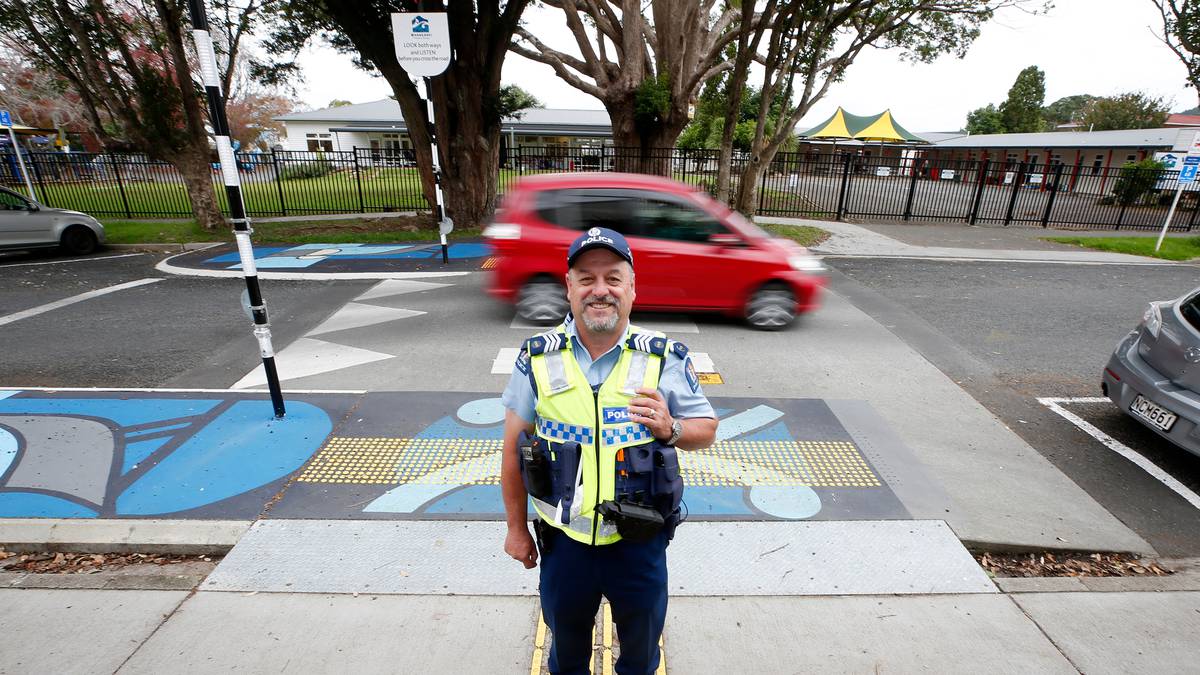Sergeant Ian Anderson has played an instrumental role in the safety of school children. Photo / Michael Cunningham
OPINION:
We’re all about to hit the road, with summer finally here and visitors able to get around. We are in holiday mode – but there are a couple of groups of people who are out there to do a job who can feel particularly vulnerable.
The first group is school patrol teams, and with most schools closing down next week, their job is done for the year. It was great to be part of the Whangārei and Kaipara school patrol teams’ winding-up and retraining session at the Aquatic Centre a couple of weeks ago. I was there representing Northland AA – the national sponsor of the high-visibility uniforms that the 470 school patrollers in our area will be wearing.
School patrols started in New Zealand in 1928 at Waikari School in Dunedin, with students waving flags from the footpath to alert oncoming drivers. They gained the power to stop traffic via government regulation in 1944, which brought about the standardised practices – the specially-trained kids and lollipop signs at school crossings – that we see today.
Sergeant Ian Anderson and Senior Constable Ewen Cummings, with their community policing team, have over 470 Year 7 and 8 children in Whangārei, Dargaville and Maungatūroto training under their eyes. They ensure that these kids have the training and the commitment of themselves, their parents and their teachers so that the programme can be run, and with a new crew every year.
This is an important job. It requires getting to school early and being prepared. They are overseen by an adult, but these kids are effectively in charge of groups of their peers. They learn valuable life skills like being organised, assertive and patient. They are recognised in class and in school reports. They get a badge and get to wear a uniform, and get rewarded with a fun day at the end of the year.
These kids could be seen to be literally taking their lives in their hands, in stepping out into traffic to be in charge of the safety of those crossing the road. It was great to be part of their acknowledgement.
While school patrols are winding up for the year, road worker crews are gearing up for another busy year. We’ve spent the winter moaning about the potholes and the general state of our roads. It’s over summer and autumn that these things get fixed, or at least maintained.
Except for the period December 21 to January 9, there will be road gangs, road cones, heavy machinery, dust, stop-go operators and ‘expect delays’ signs all over our road networks as roading contractors set about one of the largest road maintenance programs ever done in Northland.
/cloudfront-ap-southeast-2.images.arcpublishing.com/nzme/4NV2XCD5XVA45KPUIBEEU4FX74.JPG)
If you add that Niwa is predicting that the cyclone season will come early and that holidaymakers have been unleashed onto our roads for the first time in three years, then we have the potential for a perfect storm.
So – slow down, be patient and ensure that you make the time to take your time on your journey. The people working on our roads have families too, and no family expects their loved ones not to come home from work.
When doing maintenance on a road, there are all sorts of permutations and combinations for figuring out the best time, method, timing, materials, people, the desired quality and how much money is available.
There are always trade-offs that will affect someone in a negative way. It is the hands of roading engineers and contractors to do these designs and implement these decisions – but always lurking in the background is Murphy’s law.
Nothing is as easy as it looks, everything will take longer than you think, anything that can go wrong will go wrong, and Murphy was an optimist. All these types of occurrences could enter your thinking when contemplating a road journey.
Roadside workers face more risks than most of us in our workplaces. Near-misses are much too common. We can all play a role in ensuring their safety by slowing down and obeying the signs when passing through their workplaces this summer.




